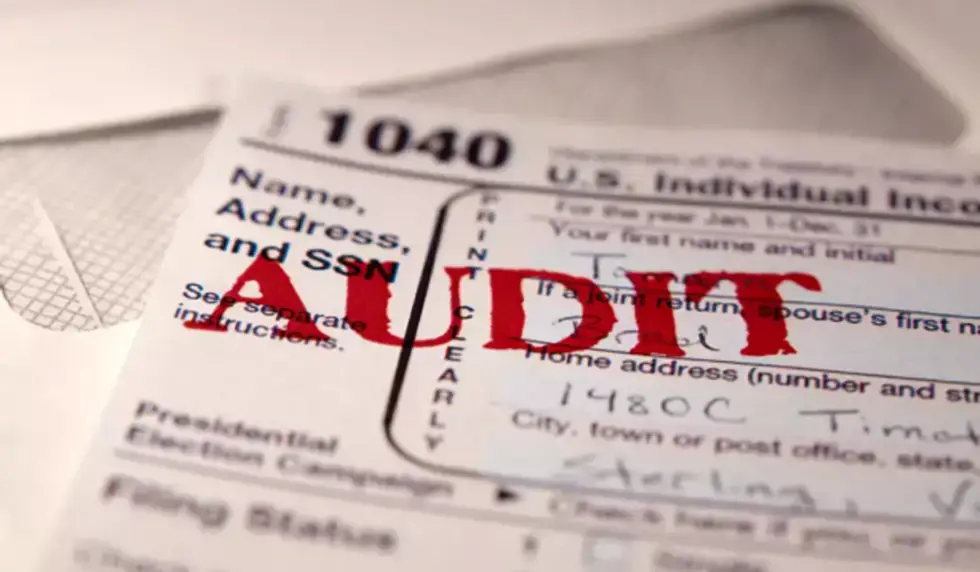Chances of being audited by the IRS in 2026: What you need to know

If you're a taxpayer, you may have wondered about your chances of being audited by the IRS.
While the audit rate for individual taxpayers has generally been declining in recent years, it's still important to understand the factors that can increase your risk and take steps to reduce them.
In this article, we'll provide a comprehensive guide to the chances of being audited by the IRS, including data on audit rates, factors that can increase your risk, and tips for reducing your chances of being audited.
Audit rates' trends
According to the IRS's Strategic Operating Plan, the agency plans to increase audit rates for high-income individuals and large corporations by 2026.
Specifically, audit rates for individuals with incomes over $10 million are expected to rise from 11% in 2019 to 16.5% by 2026. For large corporations with assets over $250 million, audit rates are projected to increase from 8.8% in 2019 to 22.6% by 2026.
It's important to note that while overall audit rates have declined, the IRS is focusing its enforcement efforts on higher-income taxpayers and large corporations. Additionally, the IRS has committed to not increasing audit rates for individuals and small businesses earning less than $400,000 annually.
These trends indicate a strategic shift in IRS enforcement priorities, emphasizing increased scrutiny on higher-income individuals and large entities.
IRS AI & new audit focus in 2025
With the Inflation Reduction Act (IRA) providing the IRS with an additional $80 billion in funding, the agency is modernizing its approach to audits.
One of the biggest changes is the use of AI-driven technology to detect inconsistencies, identify high-risk taxpayers, and flag underreported income.
Who’s under more scrutiny?
Expats should be especially cautious, as the IRS is prioritizing audits in the following areas:
- High-income earners ($400K+): The IRS has stated that taxpayers earning over $400,000 annually will face increased audit rates compared to past years.
- Cryptocurrency transactions: Digital assets like Bitcoin, Ethereum, and stablecoins are now being closely tracked. The IRS has expanded enforcement efforts to ensure expats reporting income or transactions in crypto are fully compliant.
- Foreign accounts & unreported offshore income: Expats with foreign bank accounts, investments, or business interests are seeing greater IRS oversight, especially under FATCA (Foreign Account Tax Compliance Act) and FBAR (Foreign Bank Account Report) regulations.
"IRS audits are increasingly focused on high-income expats and those with crypto holdings," says Read Kopald, CPA - "With new AI tools, even small discrepancies in foreign income reporting can trigger an IRS inquiry."
To stay compliant, expats should ensure accurate reporting of all foreign income and digital asset transactions while keeping detailed records to substantiate claims on their tax returns.
Top triggers of an IRS audit
Here are some top triggers of IRS audits:
❗ Large deductions. Claiming a high amount of deductions relative to your income may raise red flags with the IRS.
For example, if you are a small business owner and you claim $100,000 in deductions on a return that reports $200,000 in income, this may be seen as a red flag.
❗ Inconsistencies. If there are discrepancies or inconsistencies between your tax return and the information provided on other documents (such as a W-2 or 1099), the IRS may investigate further.
For example, if your tax return shows a different amount of income than what is reported on your W-2, the IRS may want to verify the accuracy of the information.
❗ Self-employment income. If you are self-employed, you may be more likely to be audited because you have more flexibility in reporting your income and expenses.
For example, if you are a freelance writer and you report a large amount of income on your tax return, the IRS may want to verify that you have the proper documentation to support your income and expenses.
❗ Home office deduction. Claiming a home office deduction can be a red flag for the IRS, especially if you are claiming a large deduction or if you have a history of claiming this deduction in the past.
For example, if you claim a home office deduction of $20,000 on your tax return, the IRS may want to verify that you are eligible to claim this deduction and that you have the proper documentation to support it.
❗ Cash-based businesses. If your business primarily deals in cash, you may be more likely to be audited because it can be harder to track and verify income and expenses.
For example, if you own a small convenience store and you primarily accept cash payments from customers, the IRS may want to verify that you are accurately reporting all of your income.
NOTE! The IRS commonly uses a variety of factors to determine which tax returns to audit, and many returns are selected at random.
Also read - How Far Back Can IRS Audit
Specific IRS red flags that put expats at risk
Beyond general audit triggers, expats face unique red flags that can increase the likelihood of an IRS audit.
These include:
1. Foreign bank accounts & FATCA/FBAR compliance
The IRS aggressively pursues taxpayers who fail to report foreign bank accounts.
Expats with accounts exceeding $10,000 at any point during the year must file an FBAR (FinCEN Form 114), while those exceeding $50,000 in foreign assets may also need to file FATCA Form 8938.
What’s at stake?
- Failure to file FBAR: $10,000+ penalty per violation
- Willful non-compliance: Penalties of up to 50% of account balances or criminal charges
How to stay compliant:
- Always disclose foreign bank accounts, pensions, and investments
- File the correct IRS forms annually
- Work with a tax professional if unsure about reporting obligations

2. Large charitable deductions
The IRS often scrutinizes tax returns where charitable deductions exceed 60% of Adjusted Gross Income (AGI).
If donations are significantly higher than average for your income level, you may be flagged for audit.
How to stay compliant:
- Keep detailed donation receipts
- If donating property or assets, obtain an independent appraisal
- Be prepared to substantiate large charitable deductions with documentation
3. Rental income & passive foreign income
Expats who rent out foreign properties or receive income from overseas investments must ensure they report all earnings properly.
The IRS has been increasing scrutiny on foreign rental income, especially when:
- Deductions appear excessive
- Rental losses are claimed multiple years in a row
- Foreign tax credits and exclusions are improperly applied
How to stay compliant:
- Report rental income from Airbnb, long-term rentals, or vacation homes
- Maintain accurate records of expenses and deductions
- If claiming foreign tax credits, ensure you’re following IRS rules correctly
Solve your tax question – ask professionals
Overwhelmed by taxes? With the right information, it gets easier.
Submit your question, and you’ll receive an answer from tax experts within a few business days. While we can’t provide detailed consultations without reviewing your documents, we’ll do our best to assist.
Actionable steps to avoid an IRS audit
While audits are rare, expats can take proactive steps to reduce your chances of being audited.
1. Record-keeping best practices
The IRS requires taxpayers to keep records for at least three years, but in cases of substantial underreporting, audits can go back six years or more.
Essential documents to keep:
- Tax returns & W-2/1099 forms (including foreign equivalents)
- Foreign bank statements & investment records
- Proof of deductions (home office expenses, business expenses, etc.)
- Rental income and expense records
- Cryptocurrency transaction logs
2. Correcting mistakes before the IRS notices
If you discover an error on your tax return, fixing it proactively can help you avoid penalties and audits.
Steps to correct a tax return mistake:
- File an Amended Return (Form 1040-X) to correct any discrepancies;
- Report any unreported foreign accounts using the Streamlined Compliance Procedures;
- If you missed reporting crypto or foreign income, amend the return before an IRS inquiry.
By staying compliant, keeping detailed records, and correcting errors before the IRS catches them, expats can greatly reduce the risk of an audit.
Bottom line
In conclusion, while the chances of being audited by the IRS in 2025 are relatively low for most taxpayers, it's still important to understand the factors that can increase your risk and take steps to reduce them.
By being accurate and thorough when preparing your tax return and keeping good records, you can minimize your chances of being audited and ensure that you're in compliance with tax laws.
FAQ
Not necessarily, but expats face unique IRS scrutiny due to foreign income reporting requirements. If you fail to file FBAR (for foreign bank accounts) or FATCA (for foreign assets), your risk of an audit increases significantly. Additionally, the IRS has been cracking down on misreported Foreign Earned Income Exclusion (FEIE) claims and overseas rental income.
Pro tip: Keeping clear documentation of income, tax payments to foreign governments, and all required IRS forms can help you stay compliant.
Yes, especially if you’re claiming the Foreign Earned Income Exclusion (FEIE) or foreign tax credits. The IRS closely examines expats who:
- Work remotely but don’t meet the bona fide residency or physical presence test.
- Claim the FEIE incorrectly, especially if they frequently travel back to the US.
- Fail to report foreign income from freelance or consulting work.
Pro tip: If you work remotely for a US employer while living abroad, you may still owe US taxes, even if you also pay taxes in your host country. Proper documentation of your travel days and residency status is crucial.
Yes, especially if your tax situation becomes complex due to frequent relocations. The IRS may scrutinize:
- Expats who claim tax benefits in multiple countries (e.g., Foreign Earned Income Exclusion in the US while also benefiting from another country’s tax breaks).
- Those who split time between the US and abroad, potentially triggering US tax residency status even if they consider themselves expats.
- Inconsistent tax reporting, such as failing to update tax residency status or improperly claiming foreign tax credits.
Pro tip: Keep a detailed travel log of entry/exit dates and understand tax residency rules in both the US and your host countries to avoid potential audit triggers.
No, it does not. However, other factors can trigger an audit, such as excessive or disproportionate deductions, frequent cash transactions, lack of supporting documentation, and frequent late filings.



